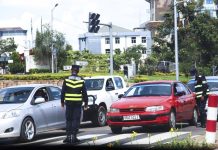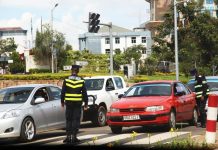Africa-Press – Rwanda. A new road traffic bill under consideration by Parliament could improve driver behaviour and road safety across the country, ACP Steven Rukumba, Commissioner for Testing and Licensing at the Rwanda National Police, has said.
Speaking on October 10 during a session with the Senate’s Committee on Foreign Affairs, Cooperation and Security, Rukumba said that the bill aims to address existing gaps in driver training and behavioural change.
Better training for new drivers
Rukumba criticised the current system where some learner drivers only train for an unregulated period, say a week, before sitting for their driving test, arguing that this does not provide adequate time to understand traffic rules or responsible behaviour behind the wheel.
“A person goes and spends one week, then sits for the exam. What it means is that they haven’t had enough time to learn traffic rules,” he said. “Driving is not just about knowing how to handle the steering wheel. There is also a behavioural aspect.”
Under the proposed bill, new drivers would be required to undergo at least 90 days of instruction before being allowed to take the driving test. This period, Rukumba explained, would allow for comprehensive education not only on traffic laws but also on responsible behaviour.
“This is where we begin shaping a driver’s behaviour. It’s also about understanding the human factor,” he added, pointing to incidents involving drivers using mobile phones or even watching YouTube videos while driving.
Merit and demerit system
One of the most significant provisions of the draft law is the introduction of a merit and demerit point system aimed at regulating driver behaviour through a combination of rewards and penalties for drivers.
“This system is expected to help shape human behaviour,” Rukumba said.
“The first phase [in road traffic rule compliance] is education and awareness, but the second phase is about applying penalties when someone repeatedly violates the rules.”
Under the system, all drivers would start each year with 15 points on their licence. Points are deducted based on the severity of traffic violations, and when all points are exhausted, a driver’s licence is suspended.
The consequences, Rukumba said, are both psychological and financial.
“For a professional driver, losing points and eventually their licence means losing their source of income. For others, it means having to hire a driver, which is an additional financial burden. These impacts are expected to influence behaviour positively,” he explained.
Examples of penalties
While addressing parliamentarians on September 30, the Minister of Infrastructure, Jimmy Gasore, said that penalty points – for set infractions – will range from two to six, depending on the offence:
· 6 points: fleeing the scene after causing an accident
· 5 points: driving with a disconnected (tampered) speed governor
· 4 points: driving under the influence of alcohol or drugs
· 3 points: driving while disqualified, overspeeding, running a red light
· 2 points: driving without insurance, or using a mobile phone while driving
Once all points are lost, the driver in question will be banned from driving until the suspension period ends.
Addressing legislative gaps
The draft law also aims to close gaps in the current legal framework, including a lack of clear regulations on the organisation and functioning of driving schools, the absence of standards for conducting driving tests, and limited oversight mechanisms for driving schools and training programmes.
Regulation of driving schools
The new bill includes guidelines for the operation and oversight of driving schools.
Article 34 of the bill proposes that a driving school must be operated by a person authorised under relevant laws, and the national road safety agency will monitor and oversee driving schools.
It provides that the minister in charge of transport will issue an order detailing the organisation and functioning of these schools.
Suspension and revocation of driving licences
Article 38 (proposed) states that a driver whose licence is suspended or revoked cannot legally drive in Rwanda, even if they hold a foreign licence.
Once the suspension period ends, the licence may be reactivated.
Data from Rwanda National Police shows that in 2024-2025, more than 409,000 drivers were fined for speed limit violations, 94,843 for distracted driving (such as through using a mobile phone), while 9,169 were arrested for driving under influence (of alcohol).
For More News And Analysis About Rwanda Follow Africa-Press




